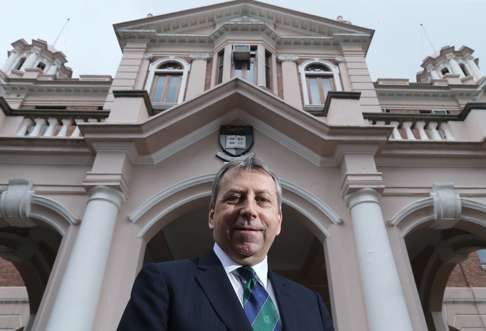
University of Hong Kong waters down controversial reform proposals, but hiring power remains in hands of a few
Revised proposals seek to address concerns about cronyism and the need for greater consensus in hiring academic staff, but critics say they don’t go far enough

Controversial new proposals to increase the powers and influence of faculty deans at the University of Hong Kong in the hiring of academics have been watered down, according to confidential documents seen by the Post.
The latest revision strips the deans of their voting power in faculty hiring committees, which can recommend appointments directly to university chiefs.
But critics said the changes don’t go far enough to check the power of deans or tackle cronyism, a problem identified as a reason for the need for reform.
Under the revised proposals, Vice Chancellor Peter Mathieson will no longer sit on the Faculty Human Resources Committee, and faculty deans, who chair the meetings, will no longer have voting rights. But the deans and Mathieson will retain their right to appoint the majority of committee members, which leaves questions about overall independence unanswered.
Faculty committees will also be able to bypass deans in “recommending” the hiring of new assistant and associate professors directly to the pro-vice-chancellor overseeing academic appointments.
An HKU spokeswoman declined to comment on whether the latest proposals required further balancing to ensure the hiring of staff would address such concerns.

As reported exclusively by the Post earlier, the reforms at HKU will still allow top management to take a more decisive role in appointing professors, effectively diluting individual faculties’ and staffing committees’ power to hire staff.
Earlier this week, Mathieson dismissed fears they would concentrate decision-making in the hands of a few – a key concern of HKU’s teachers union – as “gross misrepresentations”.
The proposals will be sent back to the university’s senate, the body in charge of all academic matters, where all members are bound by strict confidentiality rules.
One senate member was unhappy with the wording of the original document as well as the revised draft. Another member said the deans would still enjoy too much power: “Whether he or she uses that wisely, properly, is up to the dean to exercise. It devolves the power into the dean’s hands. That may cause problems.”
However, the member could not “understand the logic” behind faculty committees recommending academic hires and bypassing their deans, given that the majority of members would maintain any consensus with the deans, who also chaired the meetings.
The chairman of the university’s largest teaching union said he could not see how cronyism could be tackled with this approach.
William Cheung Sing-wai, of the Academic Staff Association, said: “This proposal is just a modification of the previous one. I don’t see the changes will make a big difference.”